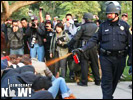Thursday, December 15, 2011
Tuesday, December 13, 2011
Sunday, December 11, 2011
Friday, December 9, 2011
Friday, December 2, 2011
Thursday, December 1, 2011
Wednesday, November 30, 2011
Pepper-Spray Creator Decries Use of Chemical Agent on Peaceful Occupy Wall Street Protesters
Monday, November 28, 2011
Thursday, November 17, 2011
Wednesday, November 16, 2011
Tuesday, November 15, 2011
Sunday, November 13, 2011
Tuesday, November 8, 2011
Monday, November 7, 2011
Sunday, November 6, 2011
Joseph Stiglitz -"Of the 1%, for the 1%, and by the 1%",
Saturday, November 5, 2011
Thursday, November 3, 2011
Tuesday, November 1, 2011
Monday, October 31, 2011
Slavoj Žižek on architecture and Ayn Rand
Slavoj Žižek about parallax, architecture and Ayn Rand. You can listen to the interview here.
Sunday, October 30, 2011
Saturday, October 29, 2011
Friday, October 28, 2011
Thursday, October 27, 2011
Subscribe to:
Comments (Atom)










